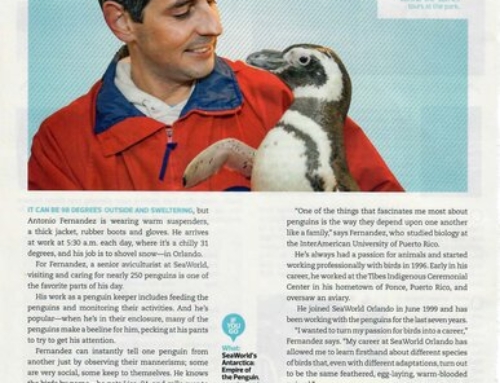Collegiate environmental groups make a difference
Recycling? Check. Clean ups? Check. Fun? Check! Across the state, collegiate groups are taking environmental matters into their own hands by hosting earth-changing events, clean ups, and demonstrations. Here are a few organizations that Mother Nature would be proud of.
Eckerd College
What: From doing regular clean-up events to challenging the first shopping day of the holiday season, members of the Earth Society stay busy.
Traditionally, the Earth Society cleans up community beaches twice a year and does restorative work to clear Brazilian pepper and garbage from its palm hammock area on campus. Every year on Earth Day, the Earth Society hosts a festival for the entire campus to increase environmental awareness.
Other outreach on campus includes making signs to promote energy and water conservation. Also, this year, the group participated in the Adbusters’ “Buy Nothing Day,” which is “a 24-hour consumer fast and celebration of sustainable living, “according to the Adbusters’ web site. The Earth Society used fliers and posters to spread their message on campus.
Why: Getting involved in clubs like the Earth Society enriches students’ lives and offers them a chance to learn about conservation issues, says Earth Society President Glory Benacka.
“Primarily, if you look at many liberal arts colleges, so many students don’t have classes that teach things about environmental awareness,” she says. “Instead, clubs like these instill conservation principles into students that they’ll hopefully continue to practice after they’re on their own.”
The club has had great success this year with some 50 registered members who receive the monthly newsletter, plus an additional 35 who are interested in learning more.
“We attract all different kinds of people with different majors,” Benacka says. “You just have to have a basic interest in the issues concerning the earth.”
Who: Contact Benacka at benackgd@eckerd.edu or 727-864-7730.
Florida State University
What: The Environmental Service Program is unique because it covers a wide range of environmental issues so that interested students can work on the issues that they are concerned about the most, says ESP Outreach Director Julia Horrocks. The club is responsible for getting recycling bins on campus and takes advantage of being in the state capitol to let government officials know about environmental issues.
Members also take an annual trip to North Carolina to participate in the Student Sierra Coalition regional conference.
Why: Environmental organizations ensure that information reaches people that maybe would not hear it otherwise, Horrocks says. Joining one enables people to come together to create solutions to problems. “Right now, environmentalism isn’t as popular as it used to be, but I’m sure that that will change when new problems arise,” she says.
According to Horrocks, part of the problem is the lack of funding given to environmental organizations because activism isn’t popular on campus. As long as people are still getting plenty of water and gas, environmental issues seem to not matter as much. “But when we start running out of these things, people will become more concerned and groups like ours will attract more people,” she says.
Who: Contact Horrocks at fsuesp@hotmail.com or 850-644-3572, or visit www.fsu.edu/~sga/esp.
North Florida Community College
What: Save Our Animal Resources has made a big impact on their campus and community through several educational and community service projects. One of the highlights of the year is the club’s annual Ecology Day where SOAR members guide some 300 local third-graders through a day of learning about the environment.
The program covers six different topics such as soil, recycling, the aquatic community, plants, and nature art. By teaming up with the school board and college 4-H to reach these children while they’re young, SOAR Advisor Barry Barnhart, says, “We want to emphasize to these children the fact that everything in this world interconnects and that it’s important to care for the earth.”
Some club members are of the four-legged or winged variety. The club took in two injured wren, an owl, and orphaned baby squirrels, to name a few. Members believe that by conserving the environment, we can conserve our animals too. SOAR members built a birdhouse for endangered bluebirds and set up benches to encourage students to sit outside more. Along with their animal-related projects, the club also promotes their recycling program and hosts an annual clean-up day where all the student organizations compete for a pizza party.
Why: “Everything in this world is connected, and it’s important to keep a balance in the web of life,” Barnhart says. “Humans are significant because they can really mess that up.” SOAR offers a way for students of all backgrounds and majors to help save the earth.
“I think it’s important to have a great diversity of things for students,” Barnhart says. “Not everyone likes teaching kids, but maybe they like caring for injured animals. Either way, SOAR provides that.”
Who: Contact Barnhart at barnhartb@nfcc.edu or 850-973-1645.
University of Florida
What: The Environmental Action Group promotes environmentalism in the community by improving recycling programs and creating service projects for Earth Day. The group has done it all, lobbying for all sorts of causes like writing letters in support of removing the dam from the Ocklawaha River. The group also participates in the UF annual “Radical Rush” to recruit new members.
“It was great because it raised awareness about positive things students are doing that may otherwise go unnoticed,” says EAG President Mike Tees. You won’t find EAG members tailgating before a football game, but you may see them picking up cans. The group held a recycling event called Recyclorama before a football game where they walked around campus collecting over 30 trash bags full of recyclables. Currently, the group is also trying to get more recycling receptacles on campus.
“While there are many recycling bins in high concentrations on some parts of campus, more need to be in classrooms,” Tees says. “Students aren’t going to walk across campus to recycle a water bottle.”
The group currently has Office Depot in its sights, pushing to get the superstore to sell more recycled paper in an effort to conserve forests. EAG hosts call-in days, writes letters, and organizes protests. Tees says that the problem with many larger public institutions is that there isn’t a requirement for students to take an environmental class. Therefore, students aren’t exposed to the importance of conservation in the 21st century.
More than ever, UF students will be counting on sunny days if EAG successfully gets their UF Clean Energy Initiative passed. It would add $4 to each student’s semester tuition to help install solar energy technology on campus. Similar projects at schools such as the University of North Carolina at Chapel Hill have caused some 50 other schools around the country to jump on the bandwagon. EAG also works with other organizations on campus such as the Animal Activists of Alachua County.
Why: Tees says that clubs like his fill a void in the collegiate educational system. “We’re doing things that larger, more national organizations aren’t doing,” he says. “We’re actually getting out there and doing things to make a difference.”
While the organization has some 500 people in its e-mail discussion group, 20 to 40 people are active within the organization. Tees says this is because many of the members on the mailing list are alumni or supporting faculty. He says that sometimes environmental clubs turn off potential members because they think they’re political. “Conserving the environment isn’t a left-wing idea; all kinds of people are concerned with the environment,” Tees says. “And they should be.”
Who: Contact Tees at emptys573@hotmail.com or 352-335-7376, or visit http://grove.ufl.edu/~eag.
University of South Florida
What: “The USF Student Environmental Association is an academic and activist group working to further environmental awareness on campus and throughout the community,” says SEA President Lily Lewis.
Each month, SEA holds at least two community cleanups. Currently, they’re working on an environmental discussion forum to spur education, discussion, and action on imminent environmental issues. Certain topics that the group will consider include the current changes being proposed for the Clean Water Act and changes in Bush’s “Clear Skies” initiative. The discussion will also feature hands-on demonstrations of alternative energy sources and an activist training workshop presented by Tom Wheatley of the Southern Utah Wilderness Alliance.
SEA members even get dramatic with a reading and interpretation of The Lorax, by Dr. Seuss. Members act out the story and have brief intermissions to explain the theories of sustainable development that are presented.
Why: “Environmental organizations help teach people a means to take action and be educated and educate others on issues that’ll impact our earth and therefore our lives,” Lewis says. She says that many people get so caught up in their daily lives that they forget that the earth is a beautiful yet sensitive environment. Environmental organizations try to bring environmental respect and concern back into the lives of these individuals, Lewis says.
Lewis believes that the reason why some students don’t join environmental clubs is that they feel things are hopeless and even inevitable. But environmental organizations work to maintain a positive approach that keeps members motivated.
Who: Contact Lewis at skylite560@aol.com or 813-905-7824.
University of West Florida
What: The greatest thing about the Student Environmental Action Society was that it was born out of the will of the students, says founder Josephine Rios. Students from all majors at UWF wanted to know why the university was last in recycling when compared to other schools in the state university system. They demanded to know why local surface waters were being polluted by lawn care chemicals and by storm water runoff from parking lots. The result of their demands was the birth of SEAS.
In SEAS, education is paramount, so the group sponsors workshops for the community about the effects of pollution. SEAS initiates the largest, most comprehensive recycling program of all learning institutions in the Escambia-Santa Rosa area. Members use grants to assist other institutions in implementing similar programs.
Why: “A clean and healthy environment is everyone’s concern,” Rios says. “We all have a hand in many daily activities that pollute the earth.” For that reason, SEAS encourages all people to adopt new ideals to reduce pollution’s adverse impacts on the air, land, and water. What people do to the environment, they also do to themselves, Rios says.
While some organizations cater to certain themes, environmental groups are for all people because it’s a global concern, she says.
“If a corporation is polluting the local drinking water, this gets everyone’s attention,” Rios says. “Environmental issues affect an entire community and span all the barriers that would otherwise separate.”
Who: Contact Rios at jr13@students.uwf.edu or 850-969-0119.
file://C:DOCUME~1ASHLEY~1LOCALS~1TempM2E09LOF.htm
–Ashley Cisneros
*****************************************************************************
Ashley Cisneros is a co-founder of Chatter Buzz Media, an Orlando Internet marketing firm that helps companies and organizations engage with their target markets through inbound marketing via the Internet. Chatter Buzz Media, which won the Social Madness competition for the Orlando small business market, is a full-service digital marketing firm specializing in website design, search engine optimization (SEO), social media marketing and content creation. Prior to founding Chatter Buzz, Ashley worked as a newspaper reporter, magazine editor, technical writer, marketing manager, public relations practitioner and freelance journalist. To see Ashley’s content writing, visit www.ashleycisneros.com. You can also reach Ashley on her Google profile.




Leave A Comment